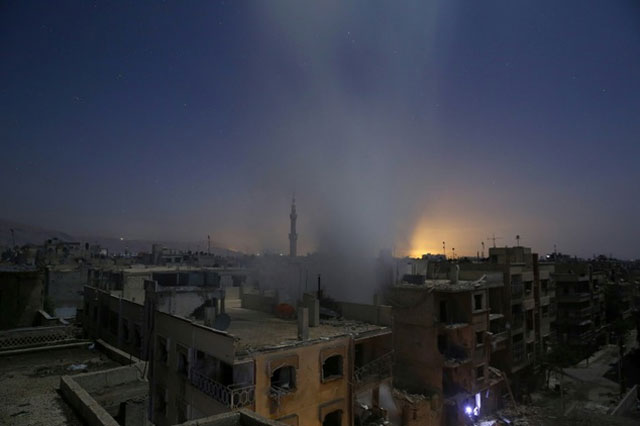
The Britain-based Syrian Observatory for Human Rights monitor said at least 32 fighters had been killed in some 15 strikes on the group's stronghold of Raqa province in northern Syria.
The monitor's head, Rami Abdel Rahman, said at least 40 militants were also wounded in the strikes, which hit IS headquarters and bases to the north, east and southeast of provincial capital Raqa city.
Syria's Assad flies to Moscow to thank Russia's Putin for air strikes
The city is the de facto Syrian capital of the group, which calls the large stretches of territory it controls in Syria and neighbouring Iraq an Islamic "caliphate".
Abdel Rahman said the casualty figures were collected from a single hospital and the final toll from the air strikes could rise.
Raqa is frequently the target of air strikes by the US-led coalition, as well as the Syrian air force, and Russian warplanes that began an air campaign in Syria in late September.
The US-led coalition has been targeting IS in Syria since last September, expanding a campaign that began with raids in neighbouring Iraq.
Drone strike kills six Da’ish fighters
Its operations have expanded further in recent days, partly in response to the deadly attacks in Paris claimed by IS.
Britain voted on Wednesday to join the coalition's strikes in Syria, after a heated debate in the country's parliament and with the staunch backing of Prime Minister David Cameron.
And German lawmakers on Friday approved plans to join the military action against the group in Syria.
In an interview published Sunday in Britain's The Sunday Times newspaper, Assad slammed London's decision to begin strikes in Syria as "illegal" and said its actions would cause "terrorism" to spread.
Assad accuses West of backing 'terrorist' groups in Syria
"It will be harmful and illegal and it will support terrorism as happened after the coalition started its operation a year or so (ago)," he told the newspaper.
Terror, he said, was like a cancer which needed to be tackled with a "comprehensive" strategy which would involve working with troops on the ground.
"You cannot cut out part of the cancer. You have to extract it. This kind of operation is like cutting out part of the cancer. That will make it spread in the body faster.
"You cannot defeat (IS) through air strikes alone. You cannot defeat them without cooperation with forces on the ground. You cannot defeat them if you do not have buy-in from the general public and the government," he said.
"They are going to fail again."
Britain began its bombing campaign early on Thursday, hitting an oilfield held by IS just hours after the parliamentary vote.
Damascus has repeatedly slammed the US-led coalition as ineffective and illegal, saying it cannot uproot IS without coordinating with the Syrian government.
Russia, a staunch Assad ally, began its strikes with the government's permission and has coordinated its raids with regime forces.
It says its raids are focused on IS and other "terrorists," but other rebels and their backers accuse Moscow of targeting moderate and religious opposition fighters over extremists.
IS rules the territory under its control with an iron fist, brutally punishing those who challenge its authority or violate its harsh interpretation of Islam.
On Sunday, the Observatory said the group had executed a media activist in the city of Deir Ezzor by tying him to two vehicles which were then driven in opposite directions.
IS accused the activist of "collaborating with the Crusader coalition" after discovering broadcasting equipment during a raid on his home, the Observatory said.
Local activists have become a key source of information about life under IS, with journalists unable to access territory it controls.
1734674217-0/Untitled-(72)1734674217-0-405x300.webp)
1734672426-0/Untitled-(71)1734672426-0-165x106.webp)
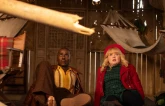
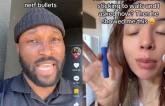
1734654707-0/luigi-mangione--(1)1734654707-0-165x106.webp)
1719476492-0/BeFunky-collage-(43)1719476492-0-270x192.webp)
1734664589-0/Cyclone-(1)1734664589-0-270x192.webp)

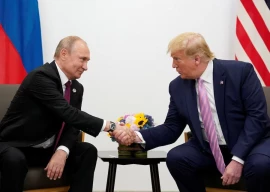


1734511806-0/Untitled-design-(5)1734511806-0-270x192.webp)
1734587529-0/Express-Tribune-(1)1734587529-0-270x192.webp)
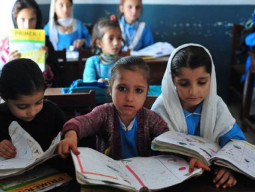
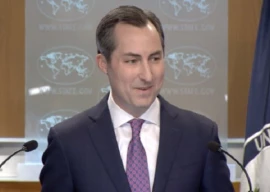
1734468458-0/Copy-of-Untitled-(50)1734468458-0-270x192.webp)







COMMENTS (1)
Comments are moderated and generally will be posted if they are on-topic and not abusive.
For more information, please see our Comments FAQ